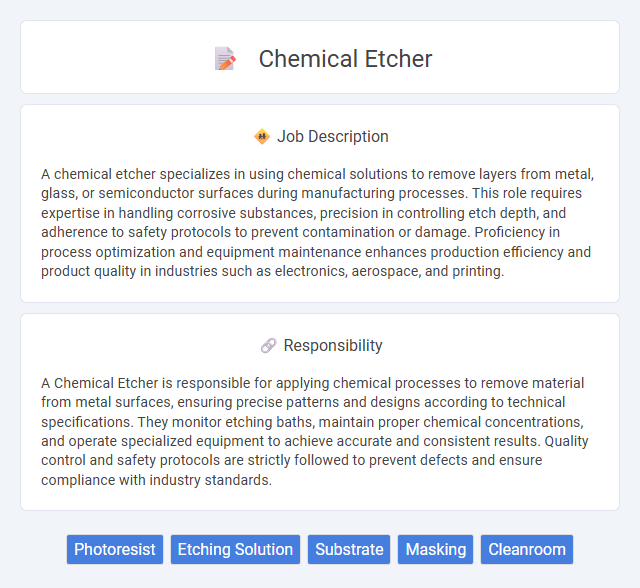
A chemical etcher specializes in using chemical solutions to remove layers from metal, glass, or semiconductor surfaces during manufacturing processes. This role requires expertise in handling corrosive substances, precision in controlling etch depth, and adherence to safety protocols to prevent contamination or damage. Proficiency in process optimization and equipment maintenance enhances production efficiency and product quality in industries such as electronics, aerospace, and printing.
Individuals with strong attention to detail and a preference for repetitive tasks may find a chemical etcher role suitable due to the precision required in handling chemicals and materials. Those with sensitivities to hazardous substances or poor tolerance for strict safety protocols might experience challenges in this environment. The job likely favors candidates who are comfortable working in controlled, industrial settings and can maintain focus during meticulous processes.
Qualification
A Chemical Etcher must possess a strong background in chemistry, typically requiring at least a high school diploma with coursework in chemical processes or a related technical field. Proficiency in handling acids and other etching chemicals safely, along with knowledge of industrial safety standards and equipment operation, is essential. Experience with precision etching techniques and the ability to read technical blueprints enhance job performance and qualification.
Responsibility
A Chemical Etcher is responsible for applying chemical processes to remove material from metal surfaces, ensuring precise patterns and designs according to technical specifications. They monitor etching baths, maintain proper chemical concentrations, and operate specialized equipment to achieve accurate and consistent results. Quality control and safety protocols are strictly followed to prevent defects and ensure compliance with industry standards.
Benefit
A chemical etcher job likely offers benefits such as gaining specialized skills in precision metalworking and surface treatment, which can enhance career advancement opportunities. It probably provides exposure to various industrial manufacturing processes, boosting technical knowledge and expertise. There may also be safety training and adherence to environmental regulations, contributing to a safer and more responsible work environment.
Challenge
Working as a chemical etcher likely involves precise control over hazardous substances, posing safety challenges that require constant vigilance and adherence to strict protocols. The complexity of etching processes could demand a high level of technical skill and problem-solving ability to achieve consistent and accurate results. It is probable that chemical etchers must adapt quickly to changes in material properties or equipment performance to maintain production quality.
Career Advancement
A career as a chemical etcher offers strong potential for advancement into roles such as process engineer, production supervisor, or quality control specialist. Mastery of chemical processes, precision in handling etching materials, and knowledge of industry safety standards enhance opportunities for promotion. Companies in semiconductor manufacturing and electronics industries prioritize skill development and certifications, boosting career growth and salary prospects.
Key Terms
Photoresist
Chemical etchers specializing in photoresist play a critical role in semiconductor manufacturing by precisely removing unwanted photoresist layers during photolithography processes. Expertise in photoresist stripping chemicals, such as oxygen plasma or specialized solvents, is essential to ensure clean pattern transfer and prevent damage to underlying substrates. Mastery of chemical reaction control and process parameters directly impacts the quality and resolution of microelectronic circuits.
Etching Solution
A Chemical Etcher specializes in preparing and applying etching solutions to metal surfaces for precise pattern removal and design creation. The etching solution typically contains acids such as ferric chloride or nitric acid, which selectively dissolve metal layers to achieve desired textures and depths. Expertise in handling and mixing these chemical agents ensures both safety and accuracy in industrial and artistic applications.
Substrate
A chemical etcher specializes in the precise removal of material from substrates such as metals, glass, and semiconductors using controlled chemical processes. Mastery of substrate composition and reactivity is essential for optimizing etching accuracy and minimizing surface damage. The role involves selecting appropriate acids or bases tailored to substrate properties to achieve desired patterning or cleaning outcomes.
Masking
Chemical etchers specialize in precision masking techniques to protect specific areas of materials during the etching process, ensuring accurate and clean removal of unwanted layers. Using advanced masking materials such as photoresist or vinyl films, they create detailed patterns to achieve high-resolution etching results in electronics, aerospace, and manufacturing industries. Mastery of masking methods directly influences the quality and efficiency of chemical etching applications, highlighting its critical role in surface treatment and component fabrication.
Cleanroom
A Chemical Etcher in a cleanroom environment specializes in precision etching processes to microfabricate semiconductor wafers, using highly controlled chemical solutions and advanced masking techniques to ensure minimal contamination. Mastery of cleanroom protocols, including gowning procedures and particle control, is essential to maintain the ISO class cleanliness standards required for semiconductor manufacturing. Proficiency with equipment such as spin coaters, resist developers, and wet benches enhances etching accuracy and product yield in high-tech fabrication facilities.
 kuljobs.com
kuljobs.com